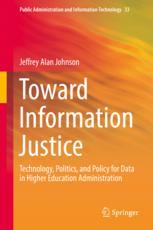

Most ebook files are in PDF format, so you can easily read them using various software such as Foxit Reader or directly on the Google Chrome browser.
Some ebook files are released by publishers in other formats such as .awz, .mobi, .epub, .fb2, etc. You may need to install specific software to read these formats on mobile/PC, such as Calibre.
Please read the tutorial at this link: https://ebookbell.com/faq
We offer FREE conversion to the popular formats you request; however, this may take some time. Therefore, right after payment, please email us, and we will try to provide the service as quickly as possible.
For some exceptional file formats or broken links (if any), please refrain from opening any disputes. Instead, email us first, and we will try to assist within a maximum of 6 hours.
EbookBell Team

4.0
76 reviewsThis book presents a theory of information justice that subsumes the question of control and relates it to other issues that influence just social outcomes. Data does not exist by nature. Bureaucratic societies must provide standardized inputs for governing algorithms, a problem that can be understood as one of legibility. This requires, though, converting what we know about social objects and actions into data, narrowing the many possible representations of the objects to a definitive one using a series of translations. Information thus exists within a nexus of problems, data, models, and actions that the social actors constructing the data bring to it. This opens information to analysis from social and moral perspectives, while the scientistic view leaves us blind to the gains from such analysis—especially to the ways that embedded values and assumptions promote injustice. Toward Information Justice answers a key question for the 21st Century: how can an information-driven society be just? Many of those concerned with the ethics of data focus on control over data, and argue that if data is only controlled by the right people then just outcomes will emerge. There are serious problems with this control metaparadigm, however, especially related to the initial creation of data and prerequisites for its use. This text is suitable for academics in the fields of information ethics, political theory, philosophy of technology, and science and technology studies, as well as policy professionals who rely on data to reach increasingly problematic conclusions about courses of action.